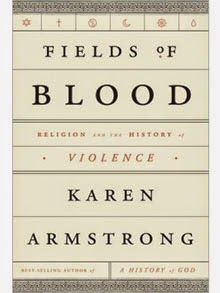Fields of Blood By Karen Armstrong
Karen Armstrong, a former Roman Catholic nun, has written several renowned books on religion, including A History of God, The battle for God, and The Case for God. I read a History of God in high school, and have been a fan of her work ever since. In “Fields Of Blood” Karen Armstrong sets out to discover the truth about religion and violence in each of the world’s great traditions. In a modern world where religious self identification is on the decline, analysts have cited the perception that faith in general is a source of aggression, intolerance, and violence; something bad for society.
For those who aren't already familiar with Armstrong's work and style of writing, I want to warn potential readers not to expect an easy read. This book is written by a scholar, and is incredibly detailed with extensive notes and references. But don't let that deter you, this is a book worth reading. It simply takes time to read and comprehend the information and details presented.
The thesis of the book is simple, religion does not cause violence, but that religion and violence are often satisfying the same primal needs. Armstrong uses examples that span the whole of human history, to support her thesis. Her argument for the case that violence often has more to do with the culture and times, the economy, and the needs of the people than with any particular religion is a solid one. She begins and ends this work with a vivid scapegoat image, but resists the easy conclusion that religion is innately and inherently violent.
We know that much of the violence of history; the French revolution, the Napoleonic wars, the American civil war, the opium wars, the first world war, the Armenian genocide, Stalin's great purge, the second world war and the Holocaust had little to do with religion. In reality, much of it was blatantly anti-religious. Yet we still have ended up with the idea that religion above all is to blame for human violence. Armstrong shows us how violence often erupts during times of great change. From when society changed from the nomadic to the settled, from the agrarian to the mercantile, from the mercantile to the industrial. But the link with religion is one of correlation, not causation.
There is a lot of dense information provided in the book, and also, for me at least, a lot of heavy feelings when she delves into more recent history, including the events of September 11th, 2001. Despite this, because of this, if the history of religion or the correlation between religion and violence interests you I recommend this be a book you pick up.
I received a free copy of this book in exchange for my honest review and opinion. The opinion here is 100% real and 100% mine.
For those who aren't already familiar with Armstrong's work and style of writing, I want to warn potential readers not to expect an easy read. This book is written by a scholar, and is incredibly detailed with extensive notes and references. But don't let that deter you, this is a book worth reading. It simply takes time to read and comprehend the information and details presented.
The thesis of the book is simple, religion does not cause violence, but that religion and violence are often satisfying the same primal needs. Armstrong uses examples that span the whole of human history, to support her thesis. Her argument for the case that violence often has more to do with the culture and times, the economy, and the needs of the people than with any particular religion is a solid one. She begins and ends this work with a vivid scapegoat image, but resists the easy conclusion that religion is innately and inherently violent.
We know that much of the violence of history; the French revolution, the Napoleonic wars, the American civil war, the opium wars, the first world war, the Armenian genocide, Stalin's great purge, the second world war and the Holocaust had little to do with religion. In reality, much of it was blatantly anti-religious. Yet we still have ended up with the idea that religion above all is to blame for human violence. Armstrong shows us how violence often erupts during times of great change. From when society changed from the nomadic to the settled, from the agrarian to the mercantile, from the mercantile to the industrial. But the link with religion is one of correlation, not causation.
There is a lot of dense information provided in the book, and also, for me at least, a lot of heavy feelings when she delves into more recent history, including the events of September 11th, 2001. Despite this, because of this, if the history of religion or the correlation between religion and violence interests you I recommend this be a book you pick up.
I received a free copy of this book in exchange for my honest review and opinion. The opinion here is 100% real and 100% mine.




Comments